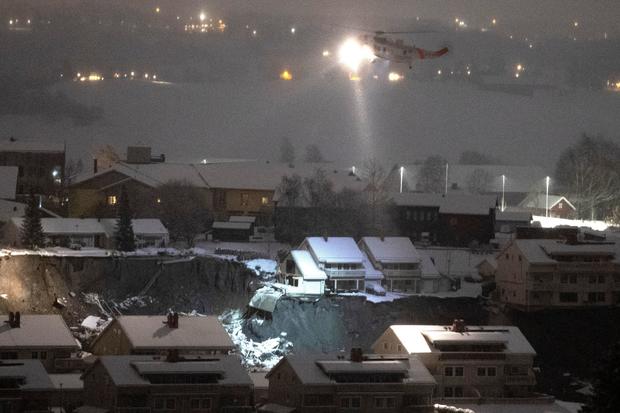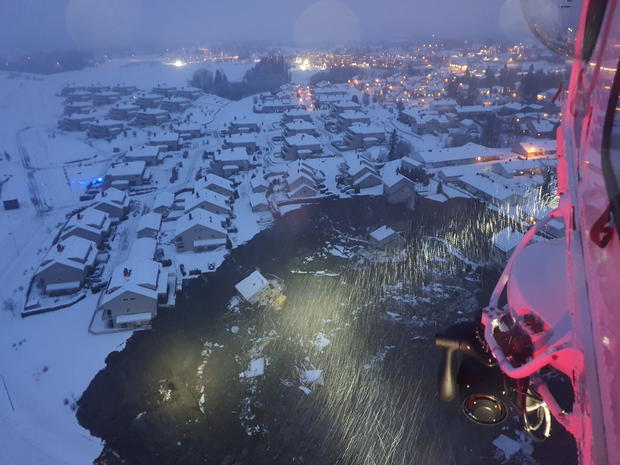Rescuers were using helicopters, drones and dogs on Thursday to survey unstable ground, a day after a major landslide destroyed homes in a village near the Norwegian capital, Oslo. Local officials said at least 10 people were still missing and 10 others were injured.
An entire hill slope collapsed Wednesday night at Ask, in the municipality of Girdrum, 15 miles northeast of the capital. The Reuters news agency reported that the houses were smashed and buried in thick, dark mud that was still so unstable on Thursday that rescuers could not reach it on foot.
TERJE BENDIKSBY / NTB / AFP / Getty
Below-freezing temperatures and snowfall have made efforts to shore up the remaining structures and find the missing more difficult, with some homes left to reel at the edge of the sliding crater. Several buildings fell on the edge on Wednesday.
Norwegian Prime Minister Erna Solberg, who traveled to the village of about a thousand people on Wednesday, described the landslide as “one of the largest” landslides the country has ever seen.
“It is a tragic experience,” Solberg told reporters, expressing his particular concern for those who are still missing.
“The situation is still unstable due to the mud to the point where it is not possible to do anything other than rescue operations by helicopter,” she added.
NTB SCANPIX via Reuters
Norwegian media said 700 people have been evacuated from their homes, and the municipality has warned that 1,500 people may need to leave the area due to safety concerns.
“We are still looking for survivors,” said Roger Petersen, head of the police operation at the site, adding that children and adults were among the missing.
Police said 10 people were injured, and one of them was transported to Oslo with serious injuries.
Petersen said Wednesday that emergency calls are coming from people who say their entire homes are moving with them indoors. Overnight, helicopters used thermal scanning technology to search for people, and they lowered several lifeguards onto the structures as part of their efforts.
“There are exciting reports and the situation is serious,” Petersen said.
According to the Norwegian Directorate of Water Resources and Energy (NVE), what happened was called a “rapid mud slip” of about 328 to 766 yards.
“This is the largest landslide in recent times in Norway, given the number of homes involved and the number of evacuees,” NVE spokeswoman Laila Hovik told AFP.
Rapid clay is a type of clay found in Norway and Sweden that can break down and turn into a liquid when stressed.
“The area was surveyed earlier and it is known to contain fast mud. The likelihood of a similar large slide in the area is weak at the moment,” Huvik said.
Reuters quoted Norwegian TV station TV2 as saying that a geological survey conducted in 2005 revealed the mud and deemed the area unsuitable for residential development, but new homes were built on the land after only two years.
Norwegian King Harald said in a rare public statement that the accident “made a deep impression” on him.
“My thoughts are with all those affected, wounded and those who lost their homes and are now living in fear and uncertainty about the full extent of the disaster,” he said.

“Infuriatingly humble social media ninja. Devoted travel junkie. Student. Avid internet lover.”




